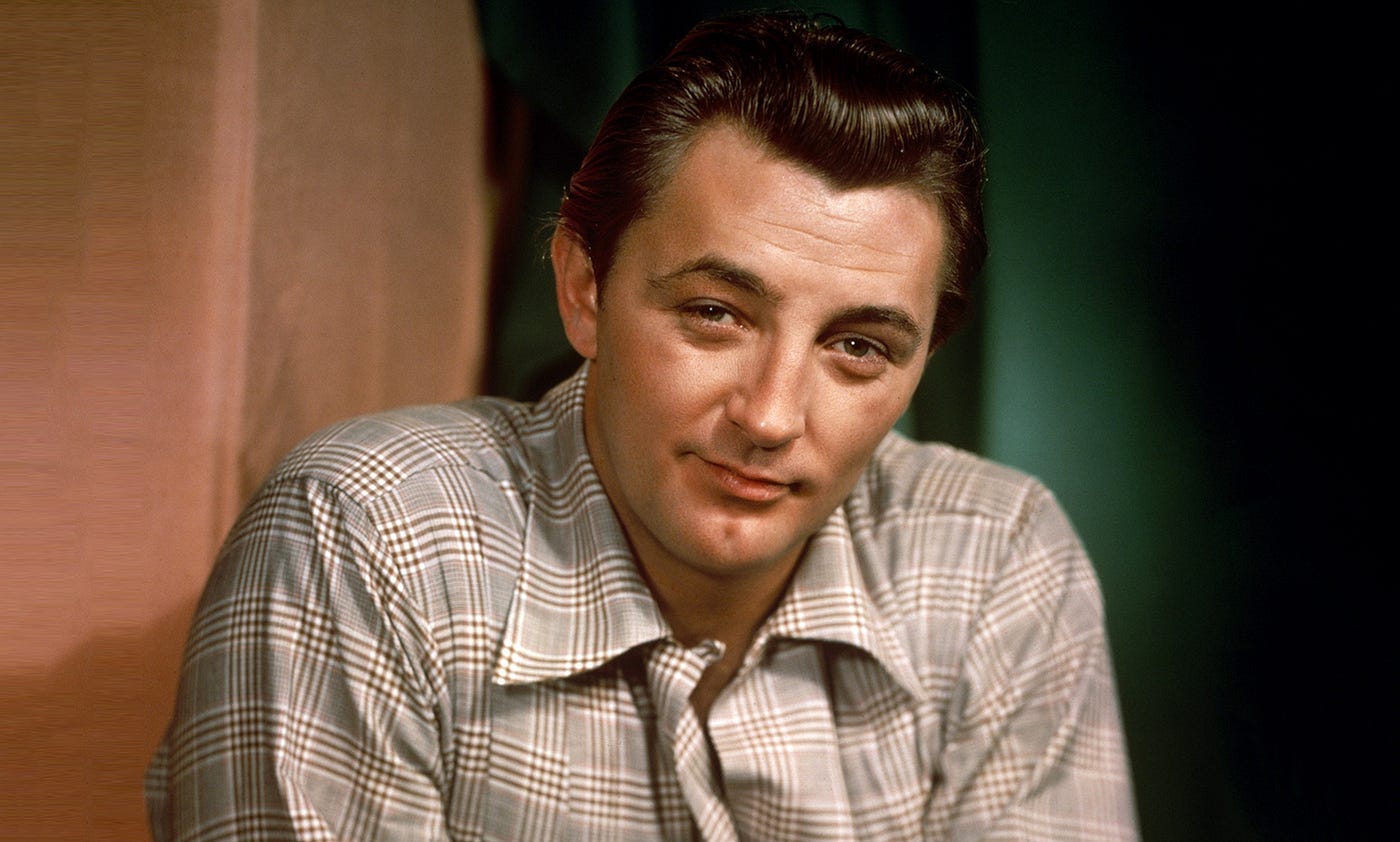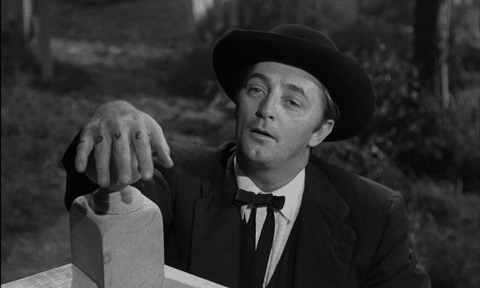TMS Spotlight: The Unforgettable Aura of Robert Mitchum
(Alamy)
I’ve joked about old Hollywood movie star Jimmy Stewart not only being my favorite male actor, but also my dream husband because of his wholesome, easy going public image, as well as Americana-esque characters he portrayed. If there’s a male star from the same period with the complete opposite reputation, it’s probably Robert Mitchum, also a longtime fave of mine just for those reasons. In an era where everyone was supposed to appear glamorous and likeable, Bob Mitchum was one of the industry’s first bad boys as we know them. He served his country as a sheet metal worker for the Airforce in WWII, yet was kicked out of two different schools growing up and was one of the first celebrities to be publicly arrested for smoking weed. He was married to his childhood sweetheart his whole career and had three children with her, but somehow had gossip as a ladies’ man. Unsurprisingly, because of all these qualities, the studios and producers quickly realized Bob would be best utilized in film noir, war epics and gritty thrillers. In fact, one of my favorite reviews on the movie logging site Letterboxd is the top-rated review for Don Hartman’s Holiday Affair (1949), which simply says: “Robert Mitchum plays a nice toy train salesman in a department store and in a shocking twist, does NOT turn out to be a murderer hiding from the cops.” Though he broke through with William Wellman’s action packed The Story of GI Joe (1945) and Jacques Tourneur’s noir mystery Out of the Past (1947), these days the most popular Robert Mitchum movies are probably Charles Laughton’s rural thriller The Night of the Hunter (1955) and J. Lee Thompson’s crime thriller Cape Fear (1962). Both very appropriate for the spook and gloom of October. When you’re used to the man with the deep voice and brooding demeanor playing a criminal masquerading as a preacher and a vengeful, recently released felon, seeing him as the lead in a Christmas romance is just a little amusing.
Bob seemed to embrace his controversies unlike leading men from the previous generation, a la Clark Gable or Errol Flynn. When he first met with Laughton while being cast in Night of the Hunter, the actor-director told ‘Mitch’ he needed the character of Harry Powell to be a ‘diabolical sh!t.’ Which made the star instantly reply, “Present!” with a smirk. When Cape Fear started production, the initial plan was for Gregory Peck to play against type as villain Max Cady before the Oscar winner got cold feet and opted for the family man hero instead. Thus Bob Mitchum was cast as Cady instead. Despite the obvious casting in both roles, the film did well with critics and fans; unlike Night of the Hunter, which was a bomb upon release and gradually grew a following and legacy over the years. There’s no doubt the man was perfect for ‘the heavy’ in films, but he was also a precursor to the anti-hero type, as noticeable in his noirs with Jane Russell, John Farrow’s His Kind of Woman (1951) and Josef von Sternberg’s Macao (1952); and later proved his romantic lead range again with Robert Wise’s Two for the Seesaw (1962) and David Lean’s Ryan’s Daughter (1970). Of course he continued to co-star in war films like 20th Century Fox’s multi-directed D-Day epic The Longest Day (1962) and appeared in westerns such as Wise’s Blood on the Moon (1948) and Howard Hawks’ El Dorado (1966). Later in his career, he had supporting roles in pictures including Richard Donner’s holiday comedy Scrooged (1988), Jim Jarmusch’s arthouse drama Dead Man (1995) and even Martin Scorsese’s 1991 remake of Cape Fear.
(via pinterest.com)
Funnily enough, although Bob’s calmness makes him come across as cool, critics initially gave him a hard time for supposedly phoning in his performances and not making an effort. Nowadays Bob’s preferences could seem like one of the earlier examples of the more natural, less theatrical form of screen acting. It’s no surprise future male actors like Clint Eastwood, Robert De Niro and Michael Madsen, along with musician John Lennon, would call Bob a favorite. Even with his rebellious image and scandals, he actually had a pretty positive history with women. The screen legend was a genuine friend of Marilyn Monroe, his co-star in Otto Preminger’s adventure River of No Return (1954); and when Preminger was visibly giving female lead Jean Simmons a hard time while shooting an intense scene of the noir Angel Face (1952), Bob, the film’s male star, defended Jean by characteristically punching Preminger in the face.
No doubt some of Bob’s antics would not be accepted today, i.e. his outdated comments on the Vietnam War, assaulting a reporter, and some off-color remarks during interviews. But I think a big reason his films and legacy have mostly aged well is because there was no glossy veneer or PR strategy to his star quality. What you saw is what you got with Robert Mitchum, and it’s an abrasive combo of self-awareness and not giving a crap. Screen presence, range, attitude, and even quite a bit of sex appeal. As the overused saying goes, “they sure don’t make them like they used to.”





Love Mitch! 🙌🏻😉
Excellent.